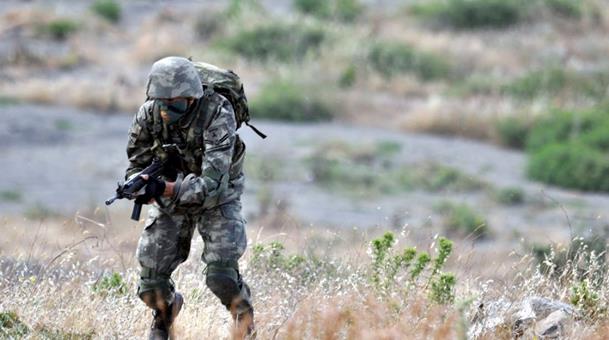“We have defeated ISIS in Syria, my only reason for being there,” wrote President Donald Trump, as he ordered the withdrawal of all U.S. forces from Syria, stunning the U.S. foreign policy establishment.
Trump overruled his secretaries of state and defense, and jolted this city and capitals across NATO Europe and the Middle East.
Yet, Trump is doing exactly what he promised to do in his campaign. And what his decision seems to say is this:
We are extricating America from the forever war of the Middle East so foolishly begun by previous presidents. We are coming home. The rulers and peoples of this region are going to have to find their own way and fight their own wars. We are not so powerful that we can fight their wars while we also confront Iran and North Korea and face new Cold Wars with Russia and China.
As for the terrorists of ISIS, says Trump, they are defeated.
Yet, despite the heavy casualties and lost battles ISIS has suffered, the collapse of the caliphate, expulsion from its Syrian capital Raqqa and Iraqi capital Mosul, and from almost all territories it controlled in both countries, ISIS is not dead. It lives on in thousands of true believers hidden in those countries. And, like al-Qaida, it has followers across the Middle East and inspires haters of the West living in the West.
The U.S. pullout from Syria is being called a victory for Vladimir Putin. “Russia, Iran, Assad . . . are ecstatic!” wails Sen. Lindsey Graham.
Graham is echoed by Nebraska Sen. Ben Sasse who called the withdrawal a “retreat” and charged that Trump’s generals “believe the high-fiving winners today are Iran, ISIS and Hezbollah.”
But ISIS is a Sunni terrorist organization. And, as such, it detests the Alawite regime of Bashar Assad, and Hezbollah and Iran, both of which are hated by ISIS as Shiite heretics.
“Russia, Iran, Syria . . . are not happy about the US leaving,” Trump tweeted, “despite what the Fake News says, because now they will have to fight ISIS and others, who they hate, without us.”
If Putin, victorious in the Syrian civil war, wishes to fight al-Qaida and ISIS, the last major enemies of Assad in Syria, why not let him?
The real losers?
Certainly the Kurds, who lose their American ally. Any dream they had of greater autonomy inside Syria, or an independent state, is not going to be realized. But then, that was never really in the cards.
Forced to choose between Turkey, with 80 million people and the second-largest army in NATO, which sits astride the Dardanelles and Bosphorus entrance to the Black Sea, and the stateless Kurds with their Syrian Democratic Forces, or YPG, Trump chose Recep Tayyip Erdogan.
And Erdogan regards the YPG as kinfolk and comrades of the Kurdish terrorist PKK in Turkey. A week ago, he threatened to attack the Kurds in northern Syria, though U.S. troops are embedded alongside them.
What kind of deal did Trump strike with Erdogan?
Turkey will purchase the U.S. Patriot anti-aircraft and missile defense system for $3.5 billion, and probably forego the Russian S-400.
Trump also told Erdogan, we “would take a look at” extraditing Muslim cleric Fethullah Gulen whom Erdogan says instigated the 2016 coup attempt that was to end with his assassination.
National security adviser John Bolton, who said U.S. troops would remain in Syria until all Iranian forces and Iranian-backed militias have been expelled, appears not to have been speaking for his president.
And if the Israelis were relying on U.S. forces in Syria to intercept any Iranian weapons shipments headed to Hezbollah in Lebanon through Damascus, then the Israelis are going to have to make other arrangements.
The war party project, to bring about regime change in Tehran through either severe sanctions leading to insurrection or a U.S.-Iranian clash in the Gulf, will suffer a severe setback with the U.S. pullout from Syria.
However, given the strength of the opposition to a U.S. withdrawal—Israel, Saudi Arabia, the GOP foreign policy establishment in Congress and the think tanks, liberal interventionists in the Beltway press, Trump’s own national security team of advisers—the battle to overturn Trump’s decision has probably only just begun.
From FDR’s abandonment of 100 million East Europeans to Stalin at Yalta in 1945, to the abandonment of our Nationalist Chinese allies to Mao in 1949, and of our South Vietnamese allies in 1975, America has often been forced into retreats leading to the deaths of allies. Sasse says Trump is risking the same outcome: “A lot of American allies will be slaughtered if this retreat is implemented.”
But is that true?
Trump’s decision to pull out of Syria at least has assured us of a national debate on what it will mean to America to extricate our country from these Mideast wars, the kind of debate we have not had in the 15 years since we were first deceived into invading Iraq.
Patrick J. Buchanan is the author of Nixon’s White House Wars: The Battles That Made and Broke a President and Divided America Forever. To find out more about Patrick Buchanan and read features by other Creators writers and cartoonists, visit the Creators website at www.creators.com.
COPYRIGHT 2018 CREATORS.COM

Leave a Reply